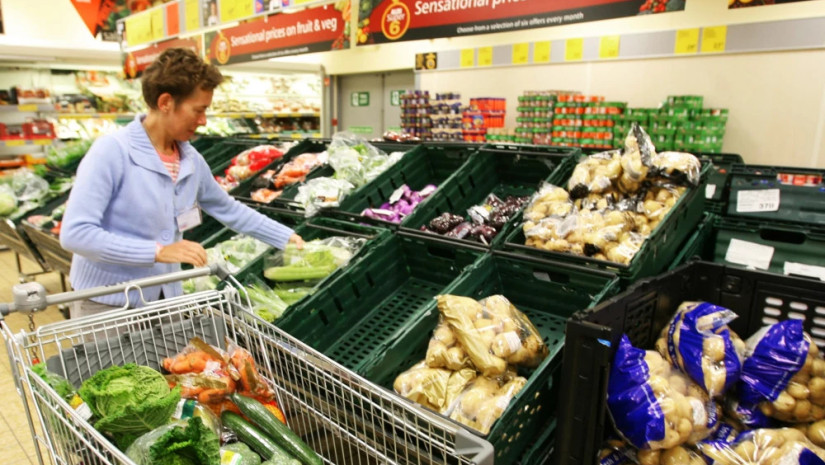U.K. inflation dropped sharply in April, as energy prices retreated and the impact of Russia’s invasion of Ukraine began to drop out of the annual consumer price comparison.
Headline CPI inflation came in at 8.7% year-on-year, the Office for National Statistics said Wednesday, down from 10.1% in March but above a consensus estimate of 8.2% from a Reuters poll of economists.
“Electricity and gas prices contributed 1.42 percentage points to the fall in annual inflation in April as last April’s rise dropped out of the annual comparison, but this component still contributed 1.01 percentage points to annual inflation,” the ONS said in its report.
“Food and non-alcoholic beverage prices continued to rise in April and contributed to high annual inflation, however, the annual inflation rate of food and non-alcoholic beverages eased, from 19.2% in the year to March 2023, to 19.1% in the year to April 2023.”
However, the ONS said its indicative modelled estimates suggested that the annual inflation rate for food and non-alcoholic beverages was still the second-highest seen for more than 45 years.
On a monthly basis, consumer prices rose by 1.2%, above a consensus estimate of 0.8%.
The Consumer Prices Index including owner occupiers’ housing costs (CPIH) rose by 7.8% in the 12 months to April 2023, down from 8.9% in March, while core CPI (excluding volatile energy, food, alcohol and tobacco prices) rose by 6.8%, up from 6.2% in March, which will concern the Bank of England.
British inflation has remained stubbornly high even as the economy has defied expectations for a recession, prompting the Bank of England to hike interest rates for the 12th consecutive time to 4.5% at its last meeting earlier this month.
Economists broadly expect a further hike at its next meeting as inflation remains stickier in the U.K. than in comparable major economies, while the labor market has stayed tight and Governor Andrew Bailey has warned of a wage price spiral.
On Tuesday, Bailey acknowledged to lawmakers that there are “very big lessons to learn” from the Bank’s failure to forecast the strength and persistence of inflation.
As British households continue to contend with high food and energy bills, workers across a range of sectors have launched mass strike action in recent months amid disputes over pay and conditions.
Right direction, but a ‘long way to go’
British Finance Minister Jeremy Hunt erred on the side of caution in his response to the data, telling the BBC on Wednesday that the falling headline rate was “welcome news,” but that there are “things underneath those numbers which show that this battle is far from over.”
He added, “We’ve got a long way to go.”
Suren Thiru, economics director at the Institute of Chartered Accountants in England and Wales, said the return to a single-digit headline rate suggests the U.K. has “turned a corner” in the fight against inflation.
He expects more big falls over the summer, as U.K. energy regulator Ofgem is expected to reduce its energy price cap, driving down bills from July.
“The drag on customer demand from a cooling jobs market, higher taxes and the lagged impact of rising interest rates may mean that inflation falls more quickly than the Bank of England has forecast,” he said.
“April’s decline in inflation is large enough for the Monetary Policy Committee to keep interest rates on hold next month, but if they continue to risk overtightening, it could worsen the cost-of-living crisis and the squeeze on businesses.”
Richard Carter, head of fixed interest research at Quilter Cheviot, also said the Wednesday fall shows that things are going in the “right direction,” but noted that there is still an “incredibly long way to go” as inflation remains “eye-wateringly high.”
However, Carter suggested such sharp declines are unlikely in the coming months, particularly if the IMF’s recent prediction of a more resilient U.K. economy is accurate.
“While the Bank of England has made no promises that it is nearing the end of its hiking cycle as far as interest rates are concerned, it will be relieved to see inflation has finally budged,” Carter said.
“For as long as wage growth continues to increase, the Bank will keep the option of further interest rate rises firmly on the table – and particularly if core inflation remains persistently high.”
















